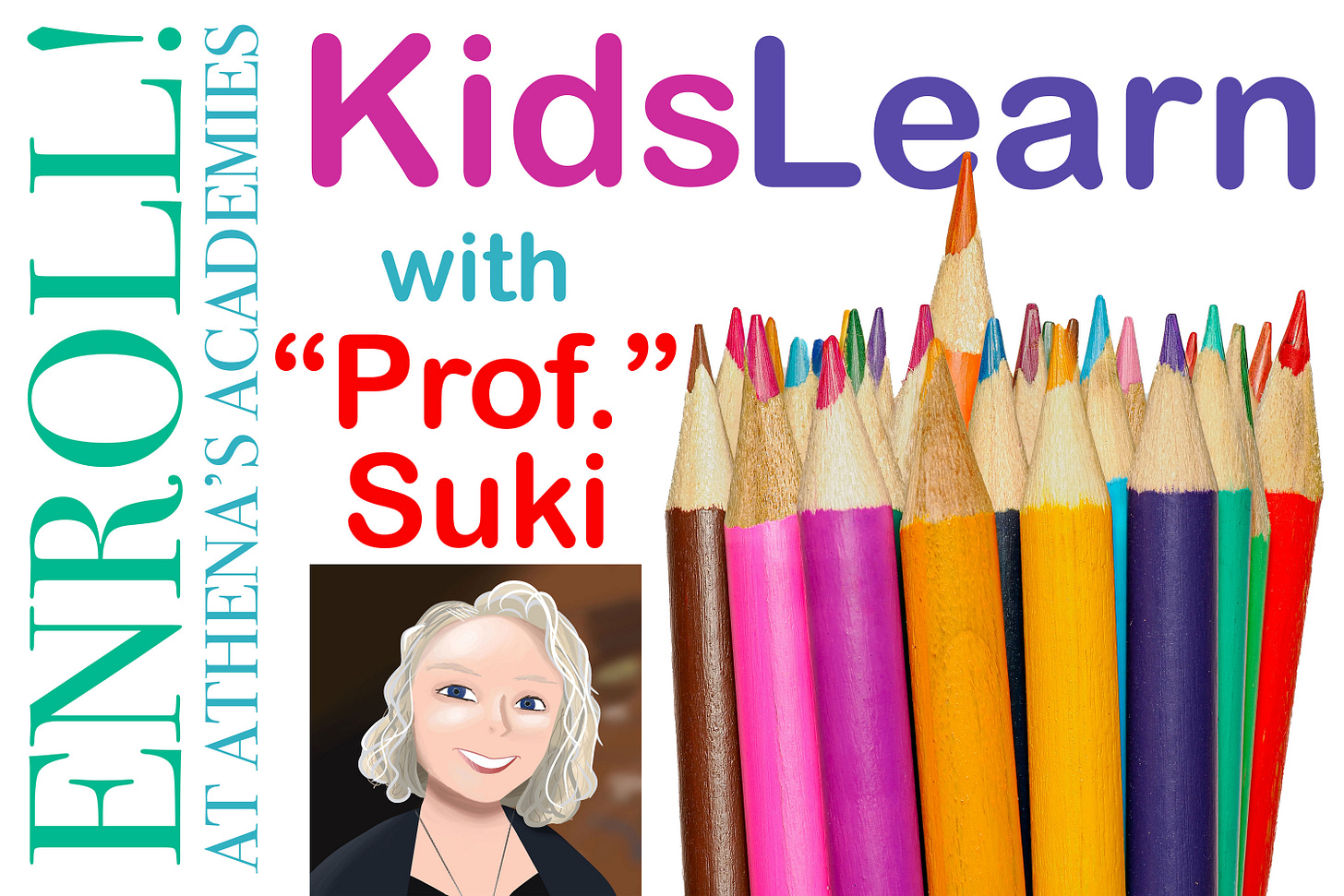Is a change of environment enough?
Accommodating neurodivergence while supporting positive growth
The KidsLearn Substack is written by Suki Wessling, known as “Prof.” Suki to her students. Scroll to the bottom for links to Suki’s work and more information.
There’s a common bit of wisdom being doled out by parents of neurodivergent kids:
“It’s not your kid; it’s the environment.”
Like all pieces of received wisdom, there is truth here. But like all pieces of received wisdom, it masks the utter complexity of parenting a neurodivergent kid.
The truth about a change of environment
One of my children received a different diagnosis everywhere he went. He was, according to environment:
“A delightful, creative child!”
“In need of antipsychotic medication.”
“High energy kid who needs to be engaged.”
“Clearly ADHD.”
In reality, there was only one diagnosis that helped us:
Twice-exceptional.
When you try to place a brilliant little person with special needs into a one-size-fits-many environment, failure is almost inevitable. We were lucky to have two great preschool teachers who could accommodate him, but kindergarten was an unmitigated disaster. Homeschooling was the answer, at least initially.
I teach neurodivergent kids online, and online classes are often the answer. One time I moved a parent to tears when I described her daughter as “a leader” in one particularly coherent group of young writers. She emailed to tell me that she was crying so hard she could hardly type. No teacher had ever said something nice about her child.
The subtleties about a change of environment
Sometimes the change itself is the catalyst, not the new environment
Anyone who has had a toddler knows that redirection can be a powerful tool. When neurodivergent kids have had a difficult time in a particular environment, usually a school, simply moving them to a new environment can often appear to be the solution. So when one parent tells you “a private school for gifted kids” is the answer, and another tells you “homeschooling” is the answer, both of them are right—at least temporarily.
When the change itself is the catalyst, the ultimate gain is small
I’ve known so many parents who hung their hopes on a new school, only to find that after their child settled in, they were almost back to square one. A change of environment does offer advantages, such as:
A press to the “reset” button, allowing kids to build new relationships without expectations.
Actual environmental changes that do help, such as a smaller classroom or a physically more welcoming space.
Changes that aren’t environmental, such as teachers trained to the child’s particular neurodivergence.
But often as the novelty wears off, parents see regression. If the change has been a positive one, the regression won’t be severe, but it can be disappointing to parents who put all their hopes into a simple solution.
Children’s needs are constantly changing
My kid who couldn’t handle a classroom was apparently tweaked by every aspect of the school environment: the feeling of other kids’ bodies around him, the bright fluorescent lighting, the chaos of transitions, the varying expectations of teachers. So imagine my surprise and delight when I found The Answer: I enrolled him in an online mythology course with Kirsten at Athena’s, and he loved it! He was the model student, raising his little digital hand to talk about Greek mythology.
But changes in his life changed his relationship to online instruction. Once he worked out the overstimulation he had experienced around other children, it turned out he was a social kid and wanted to be in a more dynamic environment. At that point, he wasn’t completely against taking some online courses because he got to spend a lot of time outside the home. But during the pandemic he was a high school senior and then a college freshman, and he suffered from the lack of interaction and hands-on learning. At this point, he will tell you point-blank that online learning is not his cup of tea!1
I’ve had scores of students who have presented their parents with similar changes. Happy homeschoolers who insisted on going to an intense, college-prep charter school. Teens who had excelled at school who suddenly (from their parents’ point of view) wanted to try self-directed learning. Happy public school families who needed private education or vice versa. It’s a common parenting mistake that we only notice that our kids are changing once they suddenly seem like a new person.

The lie about a change of environment
Finally, any simplistic truism is, let’s face it, a simplistic truism. Raising neurodivergent children is complex. I have many times summed up my children’s educational path with a happy chirp of “homeschooling saved us.” But the reality takes more time to explain:
Homeschooling did allow my non-2e child to excel in his middle school and high school years, studying intensely in his areas of interest. His nontraditional path pleased him early on, but once he started to look to college, he realized that he was going to have to rush to fill in the gaps. He enrolled in community college, slammed through the math that he’d been neglecting, and satisfied the two-year foreign language requirement in two semesters.
My 2e child did thrive in a change to homeschooling, but that’s not the complete picture. Such a picture includes this non-exhaustive list:
homeschooling through a low-attendance public homeschool program so they could get small doses of group activities
working to get our home environment balanced to serve their needs while also serving the needs of the rest of the family
occupational therapy for body regulation
dietary changes to help regulate emotional responses
building their skills so that one day they’d be able to live and work in an environment that wasn’t tailored to their needs
giving them the appropriate freedom to stretch and grow
In the end, when he was ready he chose to go back to school and because he had the tools he needed, he did well.
Learning to live with your biology
If parents focus only on a change of environment, their children will miss out on one of life’s most important lessons: wherever you go, there you are.2 You can’t run away from yourself, and you can’t run away from the neurology that allows you to run. Our job as parents and teachers of neurodivergent children is not to fix them. But our job is to give them the tools necessary to seek out the life they desire as adults. And if all we teach them is to seek comfort, we’re doing them a big disservice.
My 2e kid? He’s now a well-adjusted adult who both seeks out appropriate environments in which he thrives, but also is able to regulate his responses to environments that used to be triggers. Yes, our environments, including workplaces and education, need to be more inclusive of differently wired people, but differently wired people also need support in order to thrive in the world that they choose as an adult. It would be nice to trust that the world will adjust, but in the meantime, neurodivergent people can benefit from supports that help them meet their goals.
My child who couldn’t handle a classroom is now a successful a PhD student. What I learned parenting him is how important it was that we focused not just on an appropriate environment but also on supporting his positive growth.

And that’s quite fine with me. As an online teacher, I fully admit that online education is not the answer to everything, though I will encourage you not to listen to all the naysayers who say it’s awful.
Thanks, Buckaroo Banzai!








